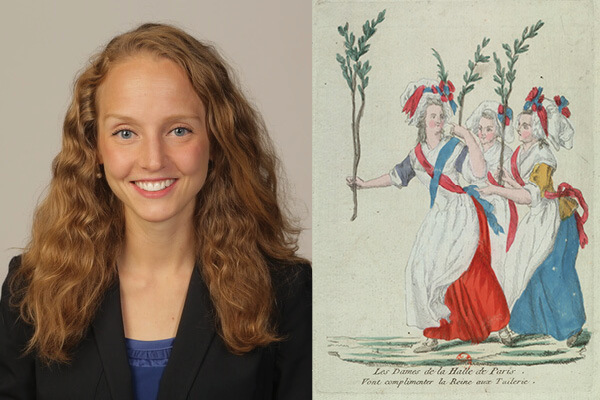
Katie Jarvis joins Notre Dame this year as Assistant Professor in the Department of History. She received her Ph.D. at the University of Wisconsin-Madison and most recently taught at Baylor University.
What is the purview of your current research?
I am a historian of early and late modern France. My research focuses on popular politics, broadly conceived, during the French Revolution. I am especially interested in the intersection of social and cultural history, as well as gender history. My current manuscript, Politics in the Marketplace: Work, Gender, and Citizenship in Revolutionary France, emanates from Parisian market women called the Dames des Halles during the French Revolution. Using the Dames as a lens, I ask how the revolutionaries negotiated the dual rise of democratic aspirations and capitalism through their everyday trade. I probe how the Dames invented a notion of nascent citizenship that took work, rather than gender, as its cornerstone. Simultaneously, I analyze how the revolutionaries debated the political role of the popular classes through the market women. These crucial contests would engross the French nation -- and much of Europe -- for decades.
How does your work fit in with the mission of the Nanovic Institute?
I have actively collaborated with colleagues within and beyond my home institutions to foster European studies. In Paris in 2010, several sociologists, historians, and I founded an independent workgroup on gender and the popular classes. To stimulate exchange across national and disciplinary boundaries, we host a research website and have organized monthly seminars at the Université Paris 1: Panthéon-Sorbonne for the past five academic years. I co-edited the June 2016 special issue of the journal Genre & Histoire with these colleagues.
I will be able to continue collaborative practices like these through the Nanovic at Notre Dame. The Nanovic’s global conference centers offer opportunities for discussions abroad and its speakers’ resources make it possible to bring these conversations to South Bend. Likewise, the Institute provides first-rate resources for my students to further their studies and research in Europe. The Nanovic also enables me to work with colleagues from diverse departments at Notre Dame who share my research interests. This is a tremendous intellectual resource. For example, our “Cultural Transformations in Modern Europe” reading group provides a space for colleagues to receive feedback on publications in progress and major grant proposals.
What courses are you teaching this semester?
I am on fellowship this semester at the Notre Dame Institute for Advanced Study where I am revising my manuscript. However, in the spring semester, I look forward to teaching “Old Regime France,” and “The French Revolution and Napoleon.”
What are your passions outside of your research?
Outside of research I enjoy running, playing the flute, exploring new places, being outside, skiing (both snow and water), and spending time with loved ones.
What do you think is the most interesting thing about Europe today?
For me, the most interesting thing is watching how Europeans are striving or resisting attempts to redefine their political and cultural identities. On the one hand, European Union policies and other international agreements have enabled more and more people to cross state borders for work, education, pleasure, and commerce. This has increased the fluidity of European networks for most citizens. On the other hand, many European nations are struggling to articulate what defines their culture and what defines the parameters of citizenship as their populations have become more linguistically, religiously, politically, and ethnically diverse throughout the twentieth and twenty-first centuries. It is a turning point in the history of many European nations.